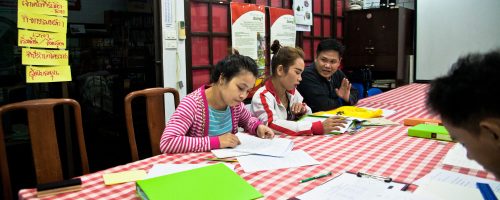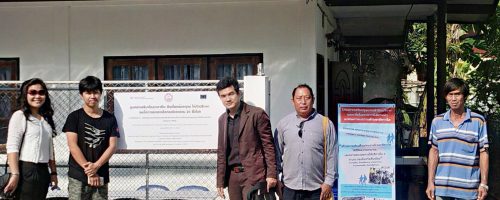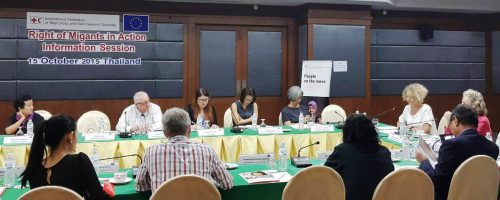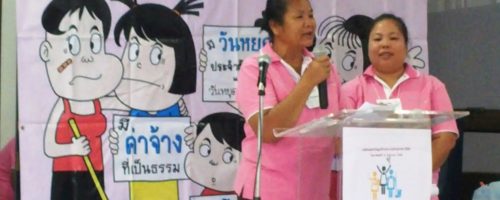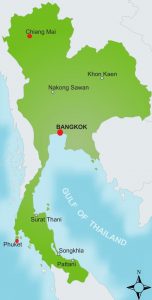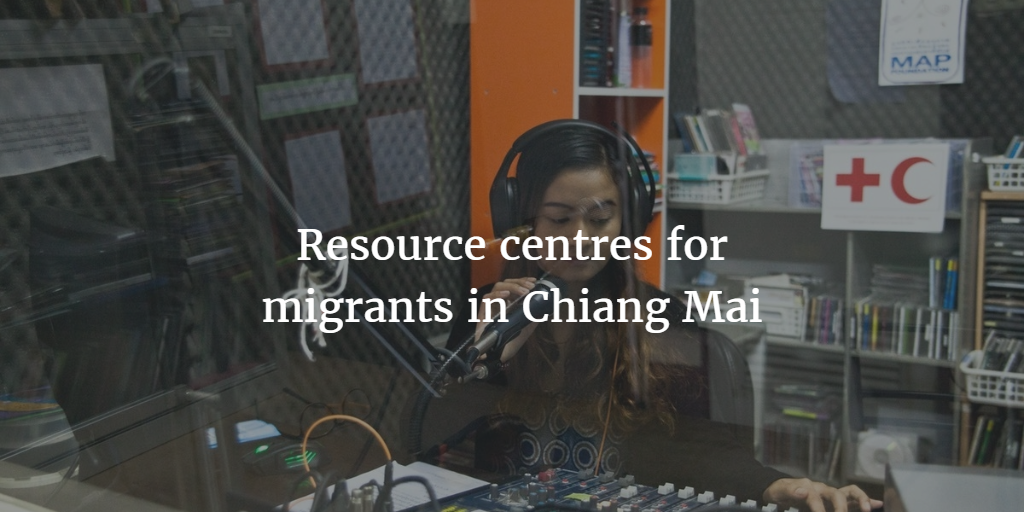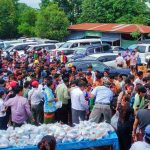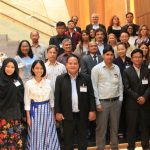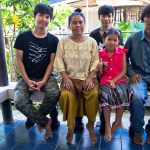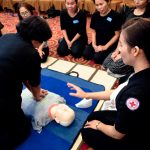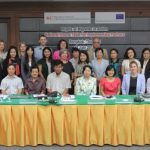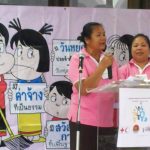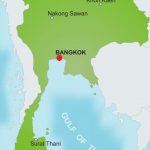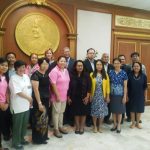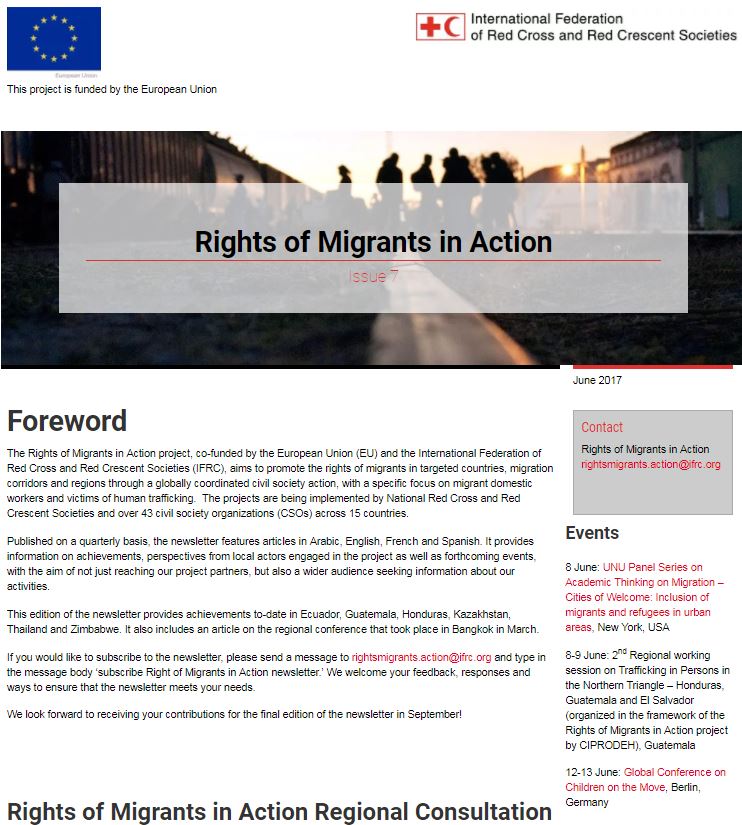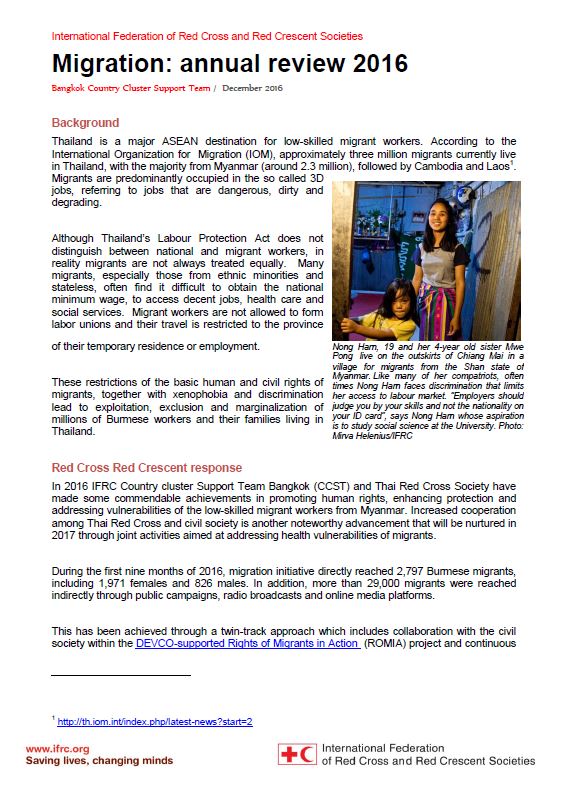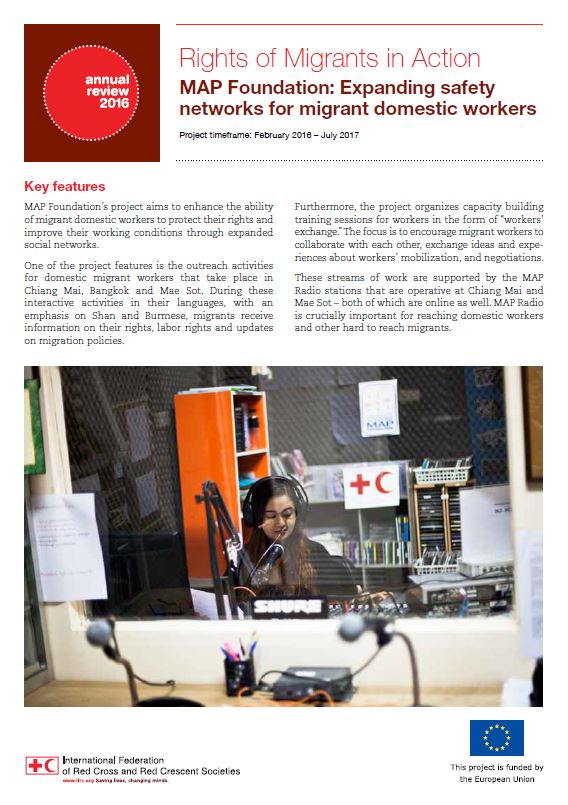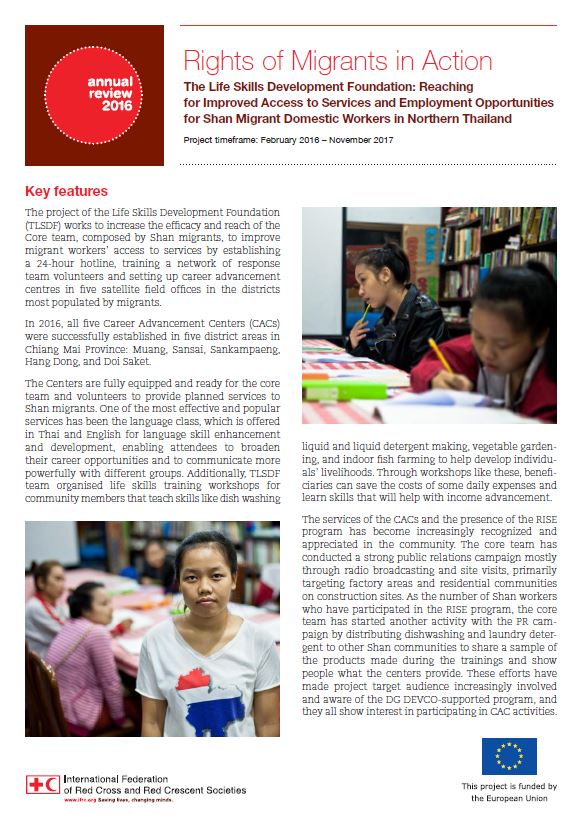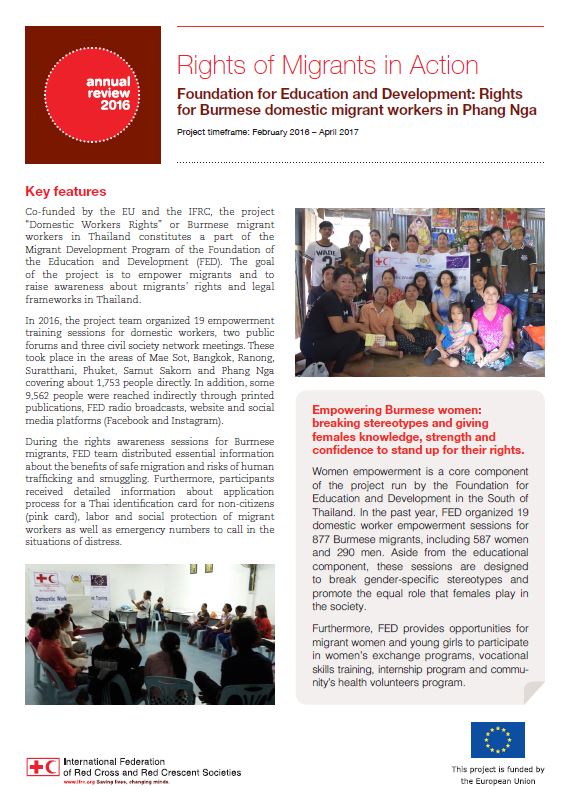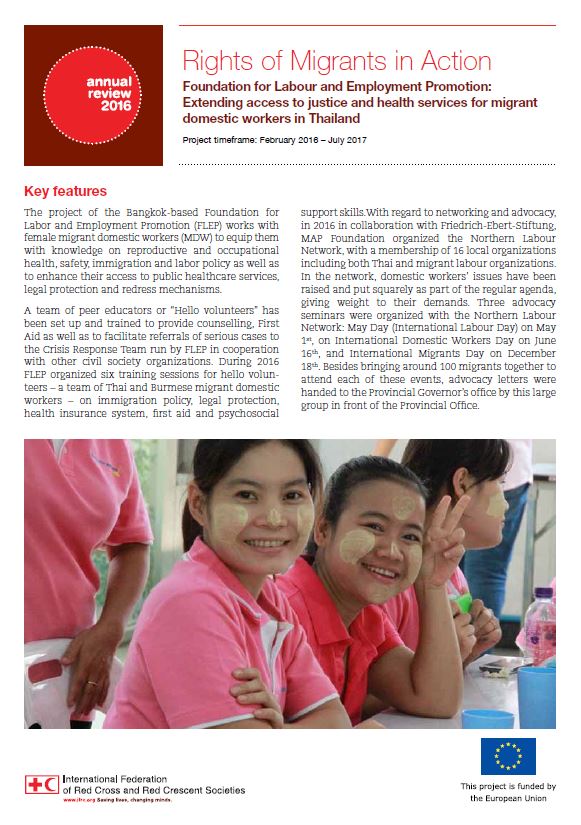Rights of Migrants in Action is a global initiative hosted by the IFRC with support from the European Union. It is implemented in 15 countries across five regions. In Africa implementing countries are Benin, Ethiopia and Zimbabwe. In the Americas region the project is running in Ecuador, Guatemala and Honduras. In Europe and Central Asia implementing countries are Russian federation, Tajikistan and Kazakhstan. In Asia the Rights of Migrants in Action projects are successfully running in Nepal, Indonesia and Thailand.
In Thailand we work with four civil society organisations that were selected for funding through the call for proposals launched in late 2015.
Bangkok-based Foundation for Labour and Employment Promotion (FLEP) works with female migrant domestic workers (MDW) to empower them to gain knowledge on reproductive and occupational health and safety, enhance access to public healthcare services and redress mechanisms. Information and mobile technologies, including bilingual mobile apps and online social platforms will be set up as a tool for information dissemination and direct response to MDW’s grievances and complaints. Additionally, the project enhances capacities of migrant and Thai domestic workers as peer educators – referred to as “Hello Volunteers” they provide counselling as well as facilitate referrals of serious cases to the Crisis Response Team run by FLEP.
The Foundation for Education and Development’s project aims to promote and protect the rights of Burmese migrant domestic workers and victims of human trafficking in Phuket. A special focus will be placed on promoting access to services for Burmese workers and raising awareness about migrant’s vulnerabilities and rights by organizing regular public forums, information sessions for recruitment agencies and local government.
In northern Thailand, Burmese domestic migrant workers benefit from regular outreach activities and expanded social networks. To utilize numerous channels of communication and to break the isolation of domestic workers MAP Foundation develops multi-media packs in migrant languages as well as continues to broadcast its weekly radio show on domestic workers’ rights.
The Life Skills Development Foundation works to increase the efficacy and reach of Migrant Workers Federation of Chiang Mai to improve migrant workers’ access to services by establishing a 24-hour hotline, training a network of response team volunteers and setting up career advancement centres in four satellite field offices in the districts most populated by migrants.
View the story of empowering migrants in Social Shorthand below:
Regional Consultations for Rights of Migrants in Action | 1-2 March 2017 | Bangkok, Thailand
1 March , 2017 - 2 March , 2017
Human Rights: The Rights of Refugees
This 15-hour online course from Amnesty International teaches about the human rights of refugees and ways to protect and promote these rights.
Migration for Development Project Cycle Management
E-training on Project Cycle Management with a specific focus on migration that has been produced by JDMI (a network of UN agencies led by UNDP). The course is a comprehensive tool on project cycle management, covering all phases from programming to evaluation, while providing tips based on the experiences of the JMDI projects. Collectively, the 6 modules in the tool will help the learner to:
- identify and address their local migration and development problems
- choose their team
- formulate key project documents
- initiate, manage and monitor their migration and development project
- prepare for both internal and external evaluations.
Project planning
Online course – 30 minutes on IFRC Learning Platform (log in required)
Project management essentials
Online course – 30 minutes on IFRC Learning Platform (log in required)
SWOT analysis
Online course – 30 minutes on IFRC Learning Platform (log in required)
Anticipating project risks
Online course – 30 minutes on IFRC Learning Platform (log in required)
Accountability: ``Blame and responsibility``-an opportunity to restore trust?
Material – 1 hour 35 minutes on IFRC Learning Platform (log in required)
e-mail: Senior Migration Officer, Helen Brunt, at helen.brunt@ifrc.org
Related videos
About Rights of Migrants in Action
Overall objective:
To promote and protect the human rights of migrants in targeted countries, migration corridors and regions through globally coordinated civil society action, with a specific focus on migrant domestic workers and victims of human trafficking.
Specific objective 1: To foster a harmonized and coordinated approach to civil society organisations toward the protection of human rights of migrants, in particular regardingmigrant domestic workers and victims of human trafficking.
Specific objective 2: To enhance migrants’ access to social services of the targeted countries, and provision of services, is enhanced through small scale CSO projects. (To enhance access to social services for migrants in host countries through small scale civil society organisation projects).
Specific objective 3: To build and strengthen the capacities of civil society organisations to support the improvements of human rights of migrants, in particular regarding migrant domestic workers and victims of human trafficking.
Target groups:
The main target groups of the action will be the civil society organisations and actors, in particular local non-governmental organisations dealing with the promotion and protection of the fundamental rights of migrants in targeted countries, but also migrants associations and workers’ associations. Employers’ associations and the private sector in general will be relevant target groups of the awareness raising activities. The central and local government authorities of the selected countries will be the main target groups of the advocacy activities.
Final beneficiaries:
The final beneficiaries will be the migrant population, in particular the most vulnerable groups (women, children, migrant domestic workers, victims of human trafficking), their families, and potential migrants from targeted countries concerned by migration and mobility.
The project will also aim to identify and establish strategic partnerships between Civil Society Organizations (CSOs) and governments at central and local levels. The involvement of civil society is important as it can complement the support provided by the state, and can often reach vulnerable migrants and victims of trafficking more effectively. NGOs also sometimes act as intermediaries between official authorities (police or judicial) of sending and destination countries, or enable and ease their international cooperation.
The Inception Phase will see the establishment of the management structure and tools, including the project team and focal points to be based in each target country. A communication strategy will be designed, target countries selected and a mapping of projects carried out.
- Under Component 1 – a baseline will be established, through desk studies and surveys. Exchange of good practices and networking between CSOs will be enabled through different means, including discussion fora, group meetings, and regional and global events. Engagement in dialogue with public authorities and launch of advocacy campaigns will be carried out.
- Under Component 2 – activities will enhance migrants’ access to social services of the targeted countries through small scale CSO projects. Main activities will include launching Calls for Proposals and evaluating, selecting and contracting the projects.
- Under Component 3 – CSO capacities will be enhanced through provision of technical assistance and training sessions prior to the launch of the Call for Proposals. Continued technical assistance to CSOs throughout the implementation period of the selected projects will be provided, touching upon both knowledge/substance and competences/skills aspects. This component will also include developing and applying coaching and monitoring mechanisms enabling a close and regular follow-up of the implementation of the selected small-scale projects.
The closing phase will mostly serve to collect, develop and promote evidence-based analysis from the implementation of the small-scale projects selected under Component 2, upon their closure, and the Action in general. In particular an evaluation and stock-taking of the small-scale projects and the Action will be carried out, followed by a presentation and dissemination of the consolidated results of the Action.
Component 1 – Coordination
- Expected Result 1.1: Dialogue with public authorities and other stakeholders is supported, in relation to the development of human rights-based and migrant-centred migration, labour and anti-trafficking policies.
- Expected Result 1.2: Exchange of good practices and networking between CSOs active in the field of human rights of migrants is enabled.
- Expected Result 1.3: Comprehensive baseline study regarding the situation of migrants and their rights in the target countries is completed.
- Expected Result 1.4: Evidence-based analysis from the implementation of the overall action is collected, developed and promoted in order to improve future actions.
The situation of CSOs, which are the main target group of the Action, will be improved at various levels, namely improved knowledge and evidence-based performance of CSOs; enhanced inter-connectivity of CSOs at global level; and increased advocacy performed by CSOs and influence towards policy development and change.
Component 2 – Access to services
- Expected Result 2.1: Direct social assistance and protection are provided to migrants and their families particularly in relation to migrant domestic workers and victims of trafficking
- Expected Result 2.2: Human rights of migrants are promoted and awareness is raised at all levels.
- Expected Result 2.3: Human-rights based migration, labour and anti-trafficking policies and legislation are promoted.
The situation of migrants, especially the most vulnerable, their families and potential migrants, which are the final beneficiaries of the Action, will be improved at various levels, namely: increased access to social public services of the target countries; increased knowledge and information about their rights and the risks posed by unsafe migration and exploitation situations; increased comprehensive support and assistance provided, in what relates, for instance, to healthcare, legal and psychological assistance, training, return and reintegration; and increased participatory approaches calling upon them to voice their concerns in the frame of advocacy actions with the end goal of influencing policy change.
Component 3 – CSO Capacity building
- Expected Result 3.1: CSO capacity in project management and grant applications is improved.
- Expected Result 3.2: CSO migration-related expertise is improved.
The situation of CSOs, which are the main target group of the Action, will be improved at various levels, namely: enhanced technical and management capacities to implement migration-related projects in their specific areas of activity; enhanced capacities to perform activities relating to prevention, protection and assistance of migrants, and advocacy for policy change; and increased harmonization and coherence of approaches of CSOs in these domains.
Updates
- Migrant workers face new labour laws and uncertainty in Thailand (July 2017)
- Regional Consultations for Rights of Migrants in Action (March 2017 in Bangkok, Thailand)
- Resource Centres for migrants in Chiang Mai
- Thai Red Cross equips Burmese migrant workers with life-saving techniques (November 2016)
- Partners call for greater collaboration to tackle vulnerabilities of migrant workers at the National Roundtable for implementing partners (July 2016)
- International Domestic Workers Day throws a spotlight on an invisible force behind closed doors (June 2016)
- Thailand: Making strides towards advancing migrants’ rights agenda (March 2016)
- Thai Red Cross Society extends support to domestic migrant workers (March 2016)
Related Documents
- E-Newsletter of Rights of Migrants in Action – June 2017
- Annual Review 2016 of Rights of Migrants in Action
- Annual Review 2016: Rights of Migrants in Action – MAP Foundation: Expanding safety networks for migrant domestic workers
- Annual Review 2016: Rights of Migrants in Action – The Life Skills Development Foundation: Reaching for Improved Access to Services and Employment Opportunities for Shan Migrant Domestic Workers in Northern Thailand
- Annual Review 2016: Rights of Migrants in Action – Foundation for Education and Development: Rights for Burmese domestic migrant workers in Phang Nga
- Annual Review 2016: Rights of Migrants in Action – Foundation for Labour and Employment Promotion: Extending access to justice and health services for migrant domestic workers in Thailand
![]()


